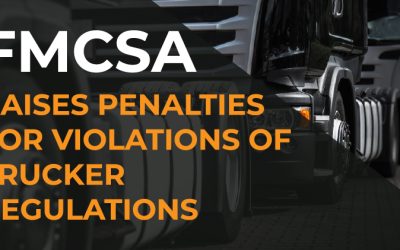
In the realm of trucking, the regulatory landscape is in constant flux. As we usher in 2023, the Compliance, Safety, and Accountability (CSA) program shapes safety, environmental, and operational standards.
Trucking companies must adapt to tightening emissions rules, shifting hours of service regulations, and rising safety benchmarks. Non-compliance isn’t just costly; it jeopardizes safety and reputation.
This guide navigates the 2023 trucking regulatory maze. We’ll explore the importance of compliance, delve into CSA, and provide a roadmap for the specific changes ahead. Whether you’re a seasoned pro or new to trucking, this guide equips you to thrive amidst regulatory shifts.
Join us on this journey to a safer, sustainable, and compliant future for trucking.
The Importance of Compliance
Compliance isn’t just a buzzword; it’s the lifeblood of the trucking industry. In a world where safety, sustainability, and operational efficiency are paramount, adhering to regulations is non-negotiable.
- Safety: Regulations exist to protect lives. Compliance ensures that vehicles are well-maintained, drivers follow safe practices, and roads are secure.
- Legal Consequences: Non-compliance leads to fines and legal troubles, impacting the bottom line and the company’s future.
- Reputation: Compliance builds trust. It shows your commitment to safety and professionalism, enhancing your reputation.
- Sustainability: Meeting environmental standards is responsible and can create business opportunities in a greener world.
- Efficiency: Compliance often drives operational improvements, making your business more efficient and cost-effective.
Compliance isn’t a burden but a strategic necessity. It’s the path to a safer, more sustainable, and prosperous future for trucking companies.
Overview of CSA (Compliance, Safety, Accountability)
CSA, short for Compliance, Safety, and Accountability, is the driving force behind safety in the trucking industry. Here’s the essence of CSA:
- Safety Priority: CSA emphasizes safety, evaluating carriers and drivers based on vehicle maintenance, driver conduct, and accident history.
- Data-Driven: It uses extensive safety data to identify high-risk carriers and drivers, ensuring a proactive approach to safety.
- Scoring System: Carriers and drivers receive scores in different safety categories, reflecting their compliance with regulations.
- Interventions: Poor performers face warnings, fines, or operational suspensions until safety concerns are resolved.
- Continuous Monitoring: CSA is an ongoing process, continuously monitoring compliance to maintain safety standards.
- Transparency: CSA scores and safety data are public, allowing informed decisions by shippers and consumers.
CSA is the roadmap to a safer trucking industry. In the upcoming sections, we’ll delve into 2023’s CSA compliance details, helping you navigate these regulations effectively.

Understanding the Regulatory Changes in 2023
In 2023, the trucking industry faces several pivotal regulatory changes that demand attention:
- Emissions Standards: Stricter emissions regulations are on the horizon. Trucking companies must prepare for engine technology changes and fuel requirements, potentially impacting operational costs and environmental compliance.
- Hours of Service (HOS): HOS regulations may see adjustments affecting drivers’ schedules. These changes aim to balance safety and efficiency but could require operational adaptations and more precise route planning.
- Safety Standards: Enhanced safety requirements, including vehicle inspection protocols and driver training mandates, may necessitate additional investments in training and equipment to meet these new standards.
- Electronic Logging Devices (ELDs): Ongoing ELD requirements continue to be refined, demanding strict adherence. Non-compliance with ELD mandates can lead to severe penalties.
Challenges in Staying Compliant
Despite the importance of compliance, trucking companies often grapple with these common challenges when navigating evolving regulations:
- Cost Implications: Meeting new regulations can be expensive. Investing in cleaner technology, additional training, and equipment upgrades can strain budgets, especially for smaller carriers.
- Resource Constraints: Many trucking companies face resource limitations, including staffing and time constraints, making it challenging to dedicate the necessary attention to compliance efforts.
- Operational Adjustments: Adapting to new regulations often requires operational changes. This may include revising routes, altering delivery schedules, and implementing new safety protocols, which can disrupt established workflows.
- Compliance Variability: Regulations can vary by region, creating complexity for interstate carriers. Navigating a patchwork of rules and requirements adds a layer of challenge to compliance efforts.
Consequences of Non-Compliance
Failing to adhere to CSA regulations can have severe repercussions for trucking companies. The consequences extend beyond financial penalties and can impact a company’s operations and reputation:
- Financial Penalties: CSA violations can result in substantial fines. These fines vary depending on the severity and frequency of violations but can quickly accumulate, eating into profits.
- Increased Insurance Costs: Non-compliance often leads to higher insurance premiums. Carriers with a history of safety violations are viewed as riskier, resulting in increased coverage costs.
- Legal Troubles: Consistent non-compliance can lead to legal actions, including suspending or revoking operating licenses. This disrupts business operations and can have long-lasting effects on a company’s viability.
- Damage to Reputation: Non-compliance can tarnish a company’s reputation. A history of safety violations can deter potential customers and partners in an industry built on trust.
- Loss of Business Opportunities: Companies with poor CSA scores may find it challenging to secure contracts and partnerships. Many shippers and customers prioritize safety and compliance when choosing carriers.
Conclusion
In the dynamic world of trucking regulations, compliance is not merely a checkbox but the foundation of a safe, sustainable, and prosperous industry. As we navigate the twists and turns of evolving regulations in 2023, one thing remains clear: adherence to the Compliance, Safety, and Accountability (CSA) standards is non-negotiable. Non-compliance consequences are not limited to fines and penalties; they extend to a tarnished reputation, lost opportunities, and even legal troubles. To thrive in this ever-changing landscape, trucking companies must stay informed, adopt a proactive approach, and embrace continuous improvement in safety and accountability.
At TMS-Digital, we understand the paramount importance of CSA compliance. As one of the top trucking solutions providers, we’re dedicated to equipping trucking companies with the tools and expertise they need to navigate these regulations effectively. By focusing on CSA compliance, we aim to ensure legal adherence and foster a culture of safety and reliability within the industry. As you continue your journey through the trucking regulatory landscape, remember that compliance isn’t just a requirement; it’s a strategic imperative for long-term success.
Ready to enhance your CSA compliance and streamline your operations? Contact TMS-Digital today and embark on a path to a safer, more efficient, and compliant future in trucking.









